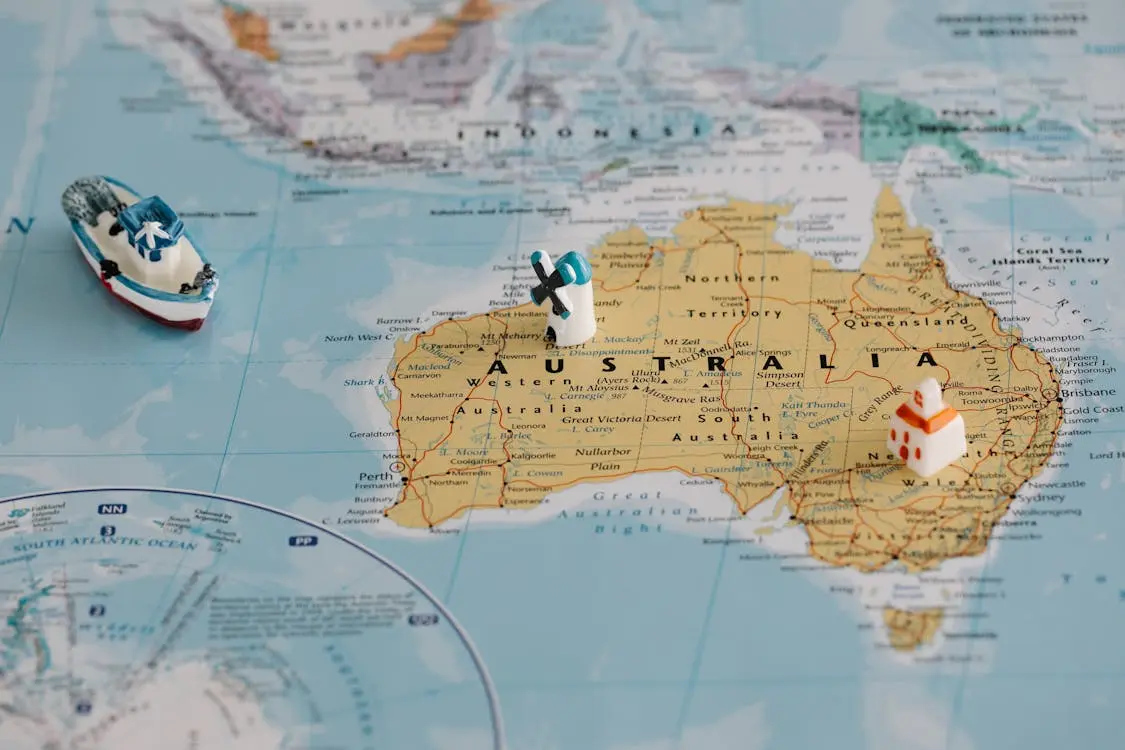
Getting Expat Home Loans in Australia
Australia’s property market is perceived a bit complicated by Aussies living overseas, making expat home loans less accessed.
But the truth is, an Australian expat home loan doesn’t have to be that hard. It just works differently, and you can navigate it just fine if you know what exactly you’re dealing with here.
Let’s explore what it is in detail, how to apply for one, and more.
So, What Is an Expat Mortgage?
An expat mortgage is a type of home loan provided by an Australian lender to an Australian citizen or permanent resident who is currently living and working overseas and wants to buy property in Australia.
On the surface, it works like a standard home loan, but since the bank knows you’re not living here, it changes how they look at things like your income, credit, and risk.
Example Scenario of an Expat Home Loan
Sarah, an Aussie nurse working in London, wanted to buy a town house in Melbourne as an investment. A regular mortgage wouldn’t have worked because her income was in pounds, and her credit history was mostly overseas.
An expat mortgage allowed her to use her UK payslips as proof of income and still secure finance for a property in Australia.
Keep in mind that not all lenders offer expat mortgages, and those that do can be picky about the risks they’re willing to take.
Expat Home Loan in Australia: How Is It Different?
If you walked into a bank branch in Sydney for a home loan, the process would be relatively straightforward. But from overseas? A bit different.
Now you might wonder why it has to be so complicated if you are an Aussie. Basically, it’s the same deal; you borrow money, repay it with interest, and own your home in the end.
But the differences are rooted in how lenders perceive risk. Here’s what they look at:
Foreign Income: Your salary might be paid in a currency like US Dollars or Euros. Currency ups and downs can make your income look smaller in Aussie dollars, so lenders adjust for that.
Job Security: Lenders want to know your job is steady, especially since you work overseas. Contract or freelance work might need extra proof, and will most often have a stricter eligibility criteria.
Taxation: Your tax obligations in your host country and in Australia can be complex. Banks need to see what you actually get paid after all deductions.
Geographic Location: Some countries are considered higher-risk by lenders due to political or economic instability, which can make lenders more cautious.
Who Can Apply for Expat Home Loans in Australia?
Generally, you’ll need to meet these basic eligibility criteria:
An Australian citizen/permanent resident living and working overseas.
Earning a stable foreign income (ideally in a major currency like USD, GBP, SGD, AED, EUR).
In some cases, foreign nationals with strong ties to Australia (like having an Aussie spouse or long-term residency history.)
Self-employed expats can apply, but lenders will want tax returns, business financials, and proof that the income is consistent.
Another factor that helps is having an existing relationship with an Australian bank. If you’ve kept an Australian savings account or once had a loan here, it can smoothen the process as the bank already knows your financial history.
What Lenders Look for in an Expat Home Loan Applicant
On top the of basic eligibility criteria we listed above, lenders will also look into more aspects of your profile, with the most of it being finance-related checklists. Here’s a closer look at these:
1. Your Income and Employment
This is the backbone of your application. Most lenders like to see a minimum annual income of around AUD $100,000 (some may accept less).
Permanent, full-time employment is ideal, but contract roles are also fine if you can meet the stricter approval terms.
Probation periods can be a red flag and slow things down.
Rental income from overseas properties can sometimes be counted, but again, it’s usually shaded (not taken at full value).
2. Your Deposit and Genuine Savings
As an expat, you can often borrow up to 90% of the property value, but putting down 20% or more is smart to avoid extra costs like Lender’s Mortgage Insurance (LMI).
Lenders also want to see that your savings are “genuine”—built up steadily over time and not just a sudden deposit.
3. Your Credit History
Just because you live overseas doesn’t mean your Australian credit file disappears.
Lenders will still check your history, and defaults, late payments, or other black marks can hurt your application.
It’s a good idea to check your credit report for free before you apply.
4. Your Existing Debts and Liabilities
All your existing financial commitments (credit cards, personal loans, car loans, and especially other mortgages) will be assessed by lenders to make sure you can manage the new repayments.
5. Your Residency and Visa Status
Be prepared to provide copies of your passport, visa for your host country, and sometimes proof of your Australian residential history.
Applying for Expat Home Loans in Australia

Unless you’re savvy in the Australian mortgage market, having a broker will help you go through the complexities smoothly. They can help you in the home loan process from start to finish.
Here at Koalify, we help expat Aussies dreaming of a home to search, curate, and get an expat home loan by ensuring the prevention of any potential mortgage traps.
The best part is that our service is free of cost to you—zero hidden fees, consultation charges, or commissions whatsoever!
And driven by ASIC’s Best Interests Duty, we guarantee to find you the most suitable expat home loans that fit your unique needs and goals.
With our extensive panel of 30+ top lenders and 2,000+ mortgage solutions in Australia, you can unlock opportunities that you might miss otherwise.
Interested? Contact us to get your dedicated mortgage advisor today!
Initial Consultation
The first step should be to consult a lender or mortgage broker who specialises in expat mortgages. They’ll help you figure out which loan option best suits your situation.
Document Collection
Expats are required to provide more documentation than residents, which can include:
Proof of identity (passport, visa details)
Proof of income (overseas payslips, tax returns, employment contract)
Bank statements (both Australian and overseas)
Australian credit report (if applicable) or an overseas credit report
Evidence of any assets or liabilities (e.g., existing loans, savings)
The more thorough and accurate your documentation, the smoother the application process will be.
Pre-Approval
Once the necessary documents have been submitted, the lender reviews your finances and offers a pre-approval. This gives an idea of how much you can borrow.
Keep in mind that it’s not a final approval, but it would help you plan.
Formal Loan Application and Property Valuation
You can submit a formal loan application once you have picked a property.
The lender will then conduct a thorough assessment of your application, including verifying your financial details and valuing the property.
Loan Approval and Offer
If your application is approved, you’ll get the loan offer with interest rate, repayments, and terms. You can review and negotiate this offer if needed.
Negotiation, however, gets easier if you have a mortgage broker, as they usually have more negotiation power due to their tie-ups with lenders.
Signing the Contract
Once you finalise and agree to the loan offer, you will sign the contract. This will officially commit you to the mortgage.
For expats, you don’t always have to be in Australia to do this; a Power of Attorney (POA) lets someone you trust handle the signing and other legal paperwork on your behalf. Make sure your POA meets Australian legal requirements.
Settlement
In this final step of the process, the lender transfers the funds to complete the property purchase, and you officially take ownership of the property, starting your mortgage repayments.
Expat Home Loans in Australia: Key Financial Pitfalls
The Income "Haircut"
You've worked hard to land a high-paying role overseas. But when you go to get a mortgage, the bank basically tells you that you earn less than you do. This is due to "income shading”.
Simply put, banks don’t usually count 100% of your overseas salary at face value. Instead, they apply a “shading” or discount of 20-40% to your foreign income when calculating how much you can borrow.
They do this to create a buffer against currency fluctuations and potential job instability in a foreign market.
Exchange rates can change quickly, and lenders want to make sure you can still make repayments even if your currency loses value against the Australian dollar.
A salary of $300,000 HKD might be reduced to as little as $180,000 AUD. This is often the single biggest shock for expats and the main reason borrowing power can be much lower than expected.
The Non-Resident Spouse Trap
If you are buying a property with your partner, their residency status is critical. If your spouse is not an Australian citizen or permanent resident, most lenders will treat the entire application as a foreign investment. This can trigger:
FIRB Fees: A mandatory application fee to the Foreign Investment Review Board, usually a few thousand dollars, depending on the property price.
State Surcharges: You may be liable for significant state government stamp duty surcharges on purchase and annual land tax surcharges, which can add a hefty sum to your costs.
The Tax Mismatch

Here is one of the most frustrating parts of the process. Even if you live in a low or zero-tax country like Singapore or Dubai, most lenders will assess your borrowing capacity using Australian tax rates.
So while you might only pay 15% tax in Singapore, the bank will calculate your disposable income as if you were paying the top marginal tax rate in Australia (currently 45%, plus the 2% Medicare Levy).
This further reduces your eligible loan amount, on top of any income shading.
The Loss of Valuable Tax Concessions
Leaving Australia can impact your eligibility for valuable property tax benefits.
The 50% Capital Gains Tax (CGT) Discount: Normally, if you sell your home, you could avoid paying capital gains tax on the profit. As a non-resident for tax purposes, you will likely lose the 50% CGT discount when you sell an Australian investment property. This means you could be taxed on the full capital gain, not just half of it.
The Six-Year Main Residence Exemption: This valuable rule allows you to treat your home as your main residence for CGT purposes for up to six years while you live elsewhere. However, a critical condition is often missed: you must first live in the property before you leave. If you buy a property from overseas and rent it out from day one without ever having lived in it, you may not qualify for this exemption.
Land tax thresholds and discounts: Some states offer discounts or higher thresholds for residents, which non-residents may miss.
Negative gearing and deductions: Interest and other expenses may not be fully deductible if your loan or property structure doesn’t meet the rules for non-residents.
Loan Limitations and Extra Hurdles
Lower Loan-to-Value Ratio (LVR): Lenders usually require a higher deposit amount from expats compared to local borrowers.
Higher Interest Rates: Some lenders charge more to account for the uncertainty of foreign income and living abroad.
Fewer Loan Options: Not all mortgage products are available to expats. Interest-only loans or some investment products may be off-limits.
Regulatory Limits: The Australian Prudential Regulation Authority (APRA) sets rules that limit how much banks can lend and to whom. This can affect LVR, interest-only availability, and borrowing capacity, so it’s another reason expats may face stricter limits.
Get Your Australian Expat Home Loan
Let us help you search, curate, and get an expat home loan by ensuring the prevention of any potential mortgage traps.
Get expert guidance fully free of cost—zero hidden fees, consultation charges, or commissions whatsoever!
And driven by ASIC’s Best Interests Duty, we guarantee to find you the most suitable expat home loans that fit your unique needs and goals.
Unlock exclusive opportunities with our panel of 30+ top lenders and 2,000+ mortgage solutions in Australia Interested? Contact us to get your dedicated mortgage advisor today!
Compare rates from multiple lenders
Let our home loan experts secure the most suitable deal for you

The images or content displayed on the koalify.com.au website, which feature financial product details including interest rates, are solely for demonstration purposes. The Koalify website does not endorse any specific credit products, and nothing contained within the site should be interpreted as offering credit advice. Should you opt to engage with a Koalify mortgage broker, credit assistance might then be provided, at which point you will receive the pertinent information and documentation relevant to your interaction. Access and use of this site and any of its services are governed by our Terms & Conditions and Privacy Policy.
© 2026 Koalify. KOALIFY GROUP PTY LTD trading as Koalify. ABN 43673755130. Credit Representative Number 557851 is authorised under Australian Credit Licence Number 389328. All Rights Reserved.
